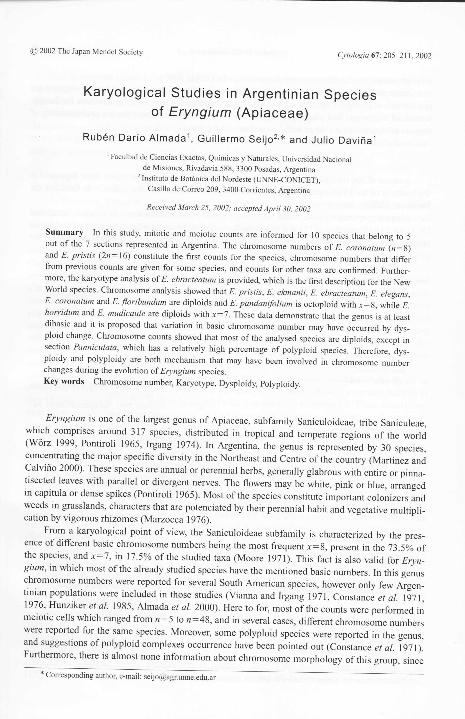Artículo
Karyological studies in argentinian species of Eryngium (Apiaceae)
Fecha de publicación:
12/2002
Editorial:
Univ Tokyo Cytologia
Revista:
Cytologia
ISSN:
0011-4545
e-ISSN:
1348-7019
Idioma:
Inglés
Tipo de recurso:
Artículo publicado
Clasificación temática:
Resumen
In this study, mitotic and meiotic counts are informed for 10 species that belong to 5 out of the 7 sections represented in Argentina. The chromosome numbers of E. coronatum (n=8) and E. pristis (2n = 16) constitute the first counts for the species, chromosome numbers that differ from previous counts are given for some species, and counts for other taxa are confirmed. Furthermore, the karyotype analysis of E. ebracteatum is provided, which is the first description for the New World species. Chromosome analysis showed that E. pristis, E. ekmanii, E. ebracteatum, E. elegans, E. coronatum and E. floribundum are diploids and E. pandanifolium is octoploid with x = 8, while E. horridum and E. mudicaule are diploids with x=7. These data demonstrate that the genus is at least dibasic and it is proposed that variation in basic chromosome number may have occurred by dysploid change. Chromosome counts showed that most of the analysed species are diploids, except in section Panniculata, which has a relatively high percentage of polyploid species. Therefore, dysploidy and polyploidy are both mechanism that may have been involved in chromosome number changes during the evolution of Eryngium species.
Palabras clave:
Chromosome Number
,
Dysploidy
,
Karyotype
,
Polyploidy
Archivos asociados
Licencia
Identificadores
Colecciones
Articulos(IMBIV)
Articulos de INST.MULTIDISCIPL.DE BIOLOGIA VEGETAL (P)
Articulos de INST.MULTIDISCIPL.DE BIOLOGIA VEGETAL (P)
Citación
Almada, Rubén Darío; Seijo, José Guillermo; Daviña, Julio Rubén; Karyological studies in argentinian species of Eryngium (Apiaceae); Univ Tokyo Cytologia; Cytologia; 67; 2; 12-2002; 205-211
Compartir
Altmétricas




